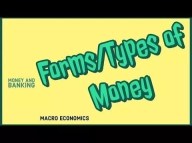10 Forms of Money are listed and explained in this article. We hope you find this informative and able to meet the demands of your research.
10 Forms of Money

Read Also: Functions and Uses of Money
Money is a medium of exchange for goods and services. Every major commodity we use daily is exchanged with money. It is anything that is widely accepted as a medium of exchange in the settlement of debts.
Forms or Types of Money
There are many Forms or Types of Money, and in this article, we will do justice to them for clarification:
1. Coins
Coins are some kind of precious metal made of silver, that has a reasonable amount of metallic content. They also have an official stamp of authority placed on them.
Coins are quite homogenous and cannot be destroyed. In Nigeria, we have coins in the following designations; 50k, 1 Naira, and 2 Naira.
Read Also: Qualities or Characteristics of Money
2. Commodity money
This is the type of money that has worth when used as money and commodity. Commodity money is valuable for its own sake because it can be used for other purposes. Commodity money can be used as a medium of exchange, for example, gold, diamond, cattle as well as beads.
3. Bank Notes
These are the most common forms of money they are paper slips or currency which is usually issued by the central bank.
Paper money came from the receipts that were issued by goldsmiths to those who deposited precious metals, e.g. gold, with them for safekeeping. They usually come in different denominations and are easy to carry about.
Read Also: How to Make Money Fast
4. Partial money
These are symbols of money that may be legal tender. They are quite acceptable within a certain area that is restricted. This kind of money is not made mandatory for acceptance by everyone because they are not backed up by law and examples include cheques, petrol vouchers, and tickets.
5. Legal tender
A legal tender is usually any form of payment through which a trader is forced to accept it as a means of settlement by the law in the settlement of debts. The legs tender often has the backing of the law and it is regarded as an offense should it be rejected.
6. Token Money
This is a kind of money that has a face value and it is greater than the value of the metal content. The intrinsic value of this money is quite lesser than the face value of such.
Read Also: Why it is Difficult to Get Loans from Commercial Banks
7. Deposit Money
Deposit money is a kind of money that is usually kept in the account of a bank. When money is deposited in the bank, it is usually credited to the account of the depositor.
The monies kept in the deposit can often be transferred through the use of a Cheque which is a written order to pay a particular person from one’s account.
8. Flat money
Fiat money is any kind of money that the government has declared to be legal tender but is not backed by any reserve.
Paper money is often considered fiat money because it can no longer be redeemed for gold and its intrinsic worth is almost nullified.
9. Fiduciary note
The fiduciary note is an issued banknote that is not backed up by gold but by relevant government securities.
Read Also: How to Start a Loan Business in Nigeria
10. Quasi money
This kind of money is equally known as near money and can also be described as money assets that may serve temporarily as money and are convertible into money within a short period without lots of value, examples of quasi-money are; drafts, bonds, treasury bills, Cheque as well as promissory notes.
These are the types of money that exist and we are quite sure that most people only know the conventional Banknotes and coins. Feel free to share.

